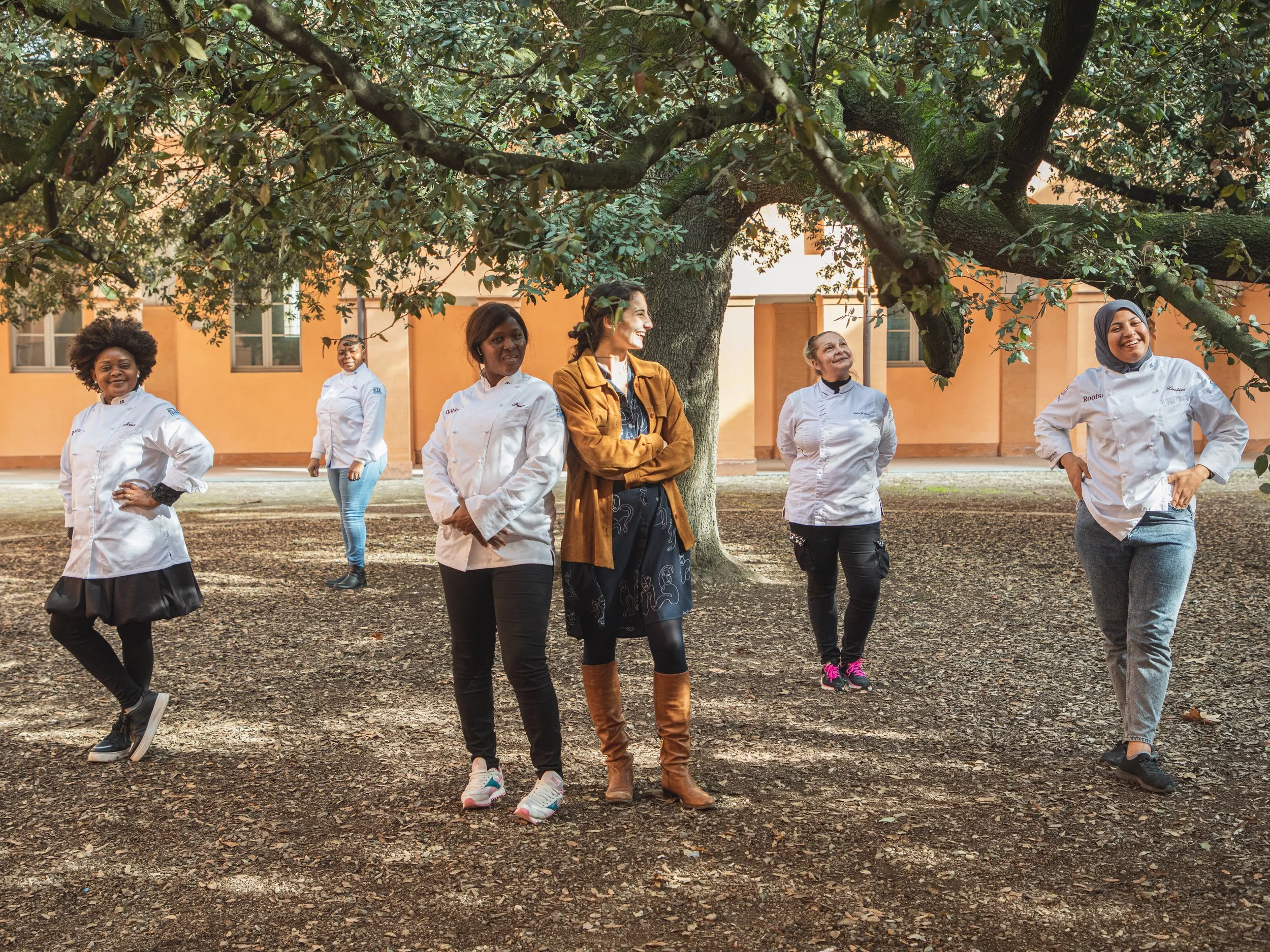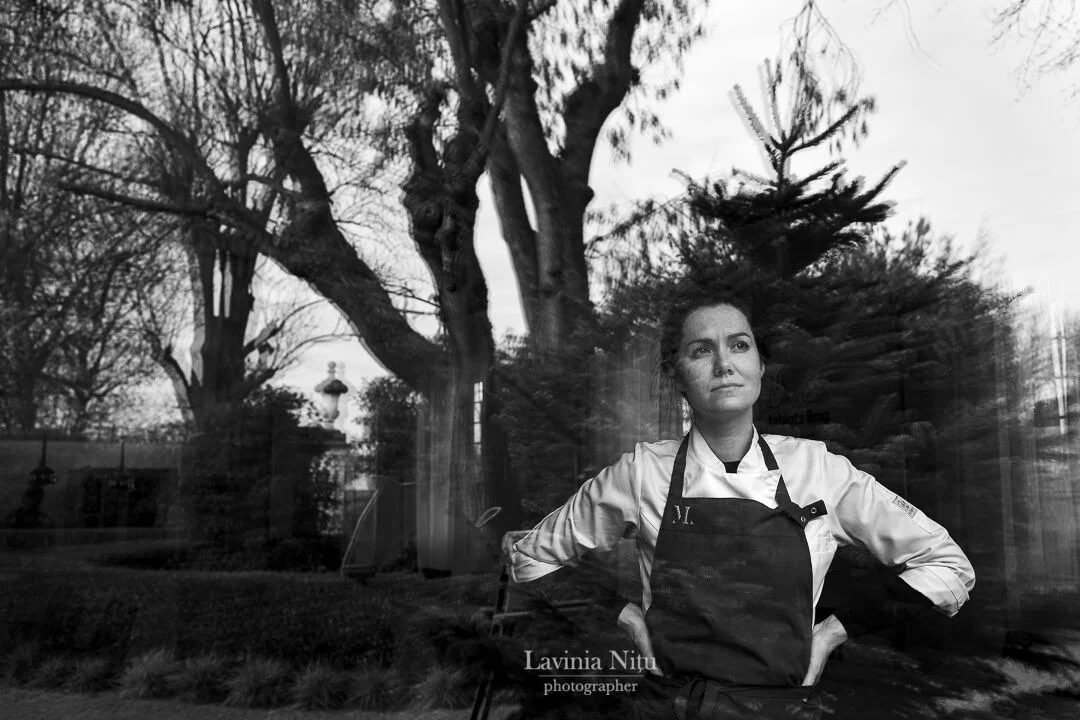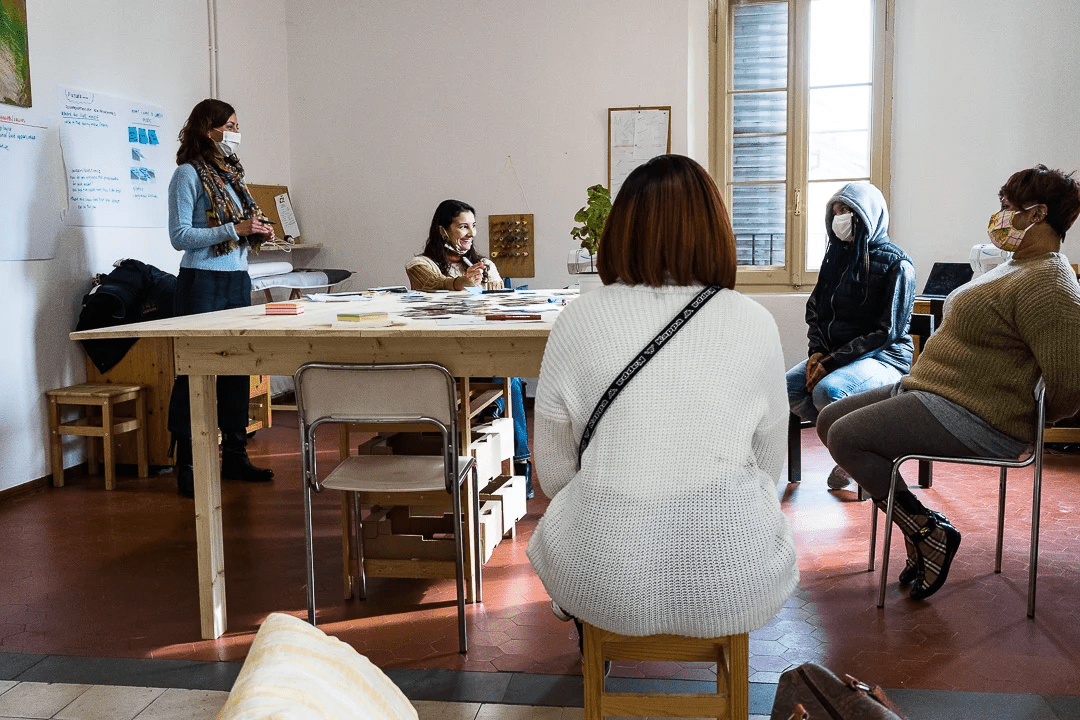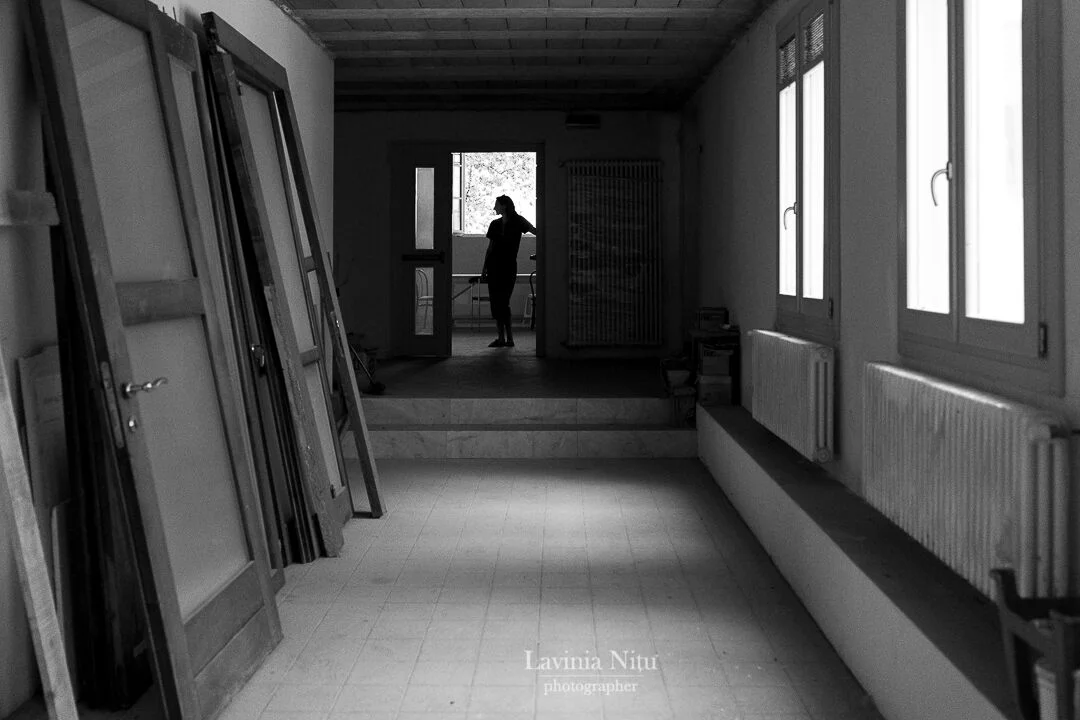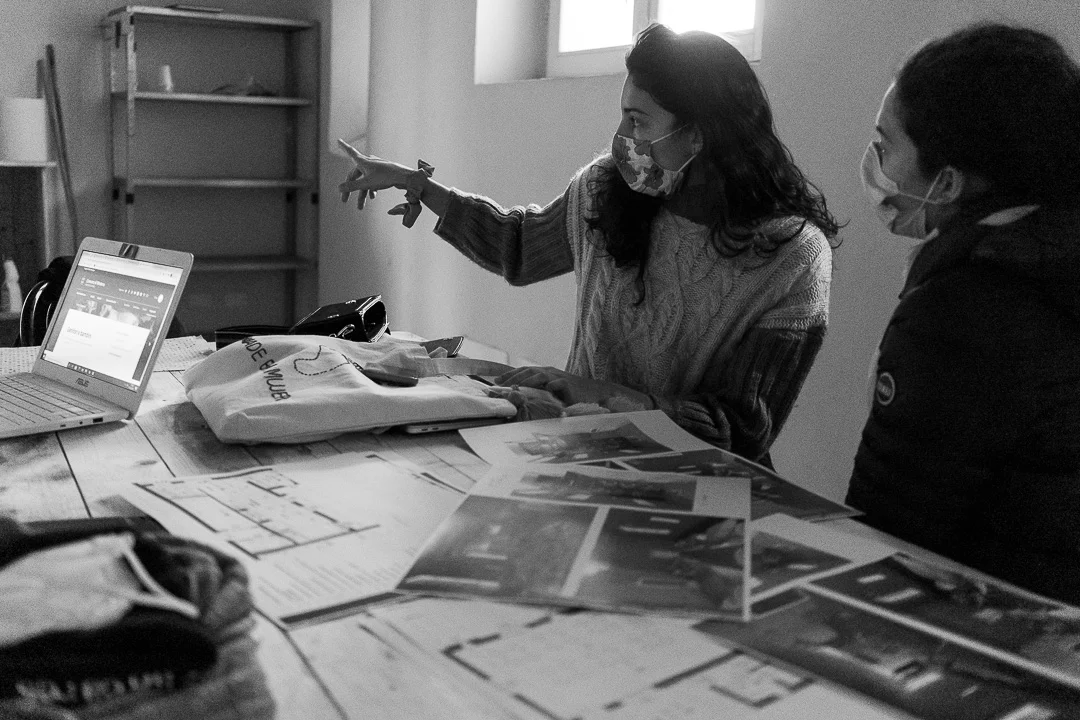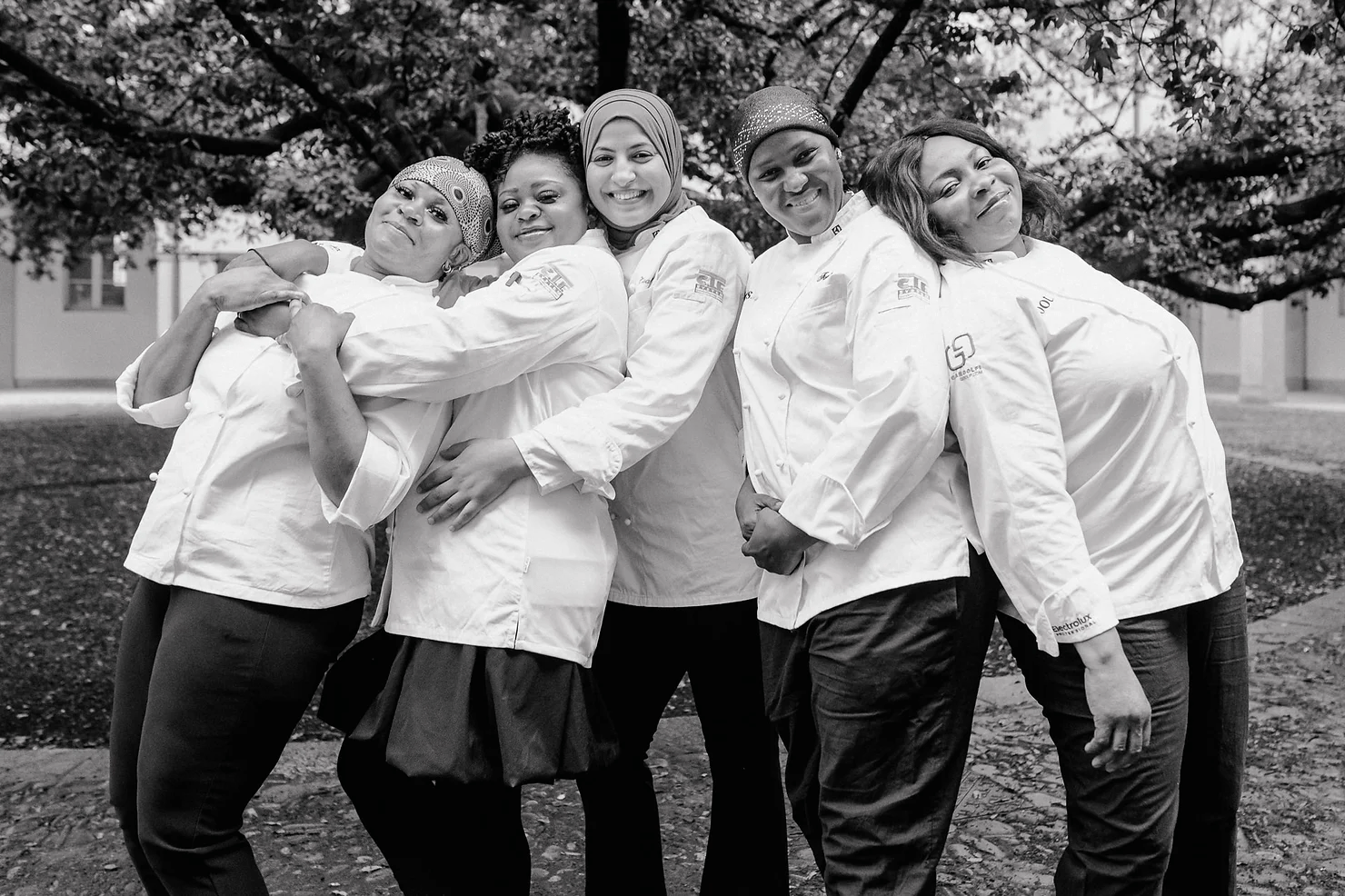After two years, Roots opens its doors as a brand new model for integration
Photo Credit: Michela Balboni
A migration story
It was July 2019, I was walking to work down via Servi, and just like any other day, I greeted the young woman who stood on the corner, always with a smile. “Hello!”
Since the first time discovering that Ella and I were both newcomers to Modena, both English-speaking, and both 26 years old, starting my day knowing that we would see each other, even for a minute, made me feel a little more at home.
With time, our quick greetings turned into conversations, and we got to know each other better. She shared her story, that she had left her home in Nigeria with the hopes to become the first woman in her family to work, but after three years and a lot of struggle, she still hadn’t been able to realize her dream.
“I found myself thinking about my own family history, myself the great-granddaughter of Italian immigrants who had left their small village in Calabria which had been crumbled by earthquake, and boarded a ship to New York, with similar hopes for a better future. Their first years would not be easy- confronted with discrimination, their own children would not be taught their native tongue, and after two generations their youngest of 12 (and my grandmother), was the first in her family to graduate from university, only to be told at her first job ‘You are pretty good… for an Italian.’”
By the time my cousins and I were growing up, the last thing tying us to our cultural heritage (other than our olive complexion), was the food. Each Sunday, my grandmother would prepare sauce and meatballs, a tradition she learned by watching her older sister, who learned by watching her mother, Rosa, the first-generation Italian migrant.
Now three generations later, I find myself back at the root of my heritage, meeting another young woman who, with one very brave act, is just beginning her family’s story of migration.
Mission: to help Ella find a job
“I made it my personal mission to help Ella, who I saw so clearly to be, like me, a young person with so much potential— but with the added grit and motivation that only someone who had come so far, and sacrificed so much, can possess. ”
At the time I was working for Food for Soul, the non-profit founded by Chef Massimo Bottura, so my world was surrounded by chefs and restauranteurs, and I knew that there were plenty of entry-level positions available. Ella was employed within the week.
Discovering an opportunity
Over the next months, I would continue to support Ella with everything she needed post-employment, which turned out to be a lot.
When it was time to review a contract, I did my best to convey what only months before my Italian boyfriend had tried to explain to me; when it was time to review the monthly payslip, I stumbled my way through google translate.
Together, Ella and I were figuring it all out. We were empowering each other.
It was then, when I started to think – Amazing to connect women to jobs, but unsustainable—what we really need is a program that helps women gain the skills and experience necessary to gain more fulfilling positions, and at the same time prepares them better for the cultural, legal, and financial aspects of working in Italy.
Around that time, I invited Ella and her new boyfriend over to cook a Nigerian dinner at my home. As a person who grew up celebrating every birthday at Mexican restaurants in the United States, I was sorely missing international flavors here in Modena, and so I thought it would be the perfect opportunity to spend time with Ella and learn more about her culture. That night my kitchen was filled with okra, yam, fufu, malt, and other colorful ingredients that were completely new to me; and I (completely inept in the kitchen) watched amazed as two young people with no culinary training whipped up a masterful meal.
Chef Jessica Rosval, Culinary Director of AIW. Photo by Lavinia Nitu
Could we open a restaurant?
Since my first day at work at Food for Soul, I wanted to be on Jessica Rosval’s team. As I toured the kitchen of Osteria Francescana, Jessica stopped me in my tracks to introduce herself, saying confidently:
““If you need anything - don’t hesitate- Welcome to the team.” ”
We became instant friends, and I listened in awe at her story of how she came to Modena from Canada, not speaking a word of Italian, but promising on her first day in Massimo’s kitchen that she would speak fluent Italian within the year.
Over the next years we would host brunches at each other's houses, start an annual American Thanksgiving party, and get in passionate discussion over women’s issues.
At the first of many aperitivo meetings, when I told Jess about Ella’s story, and asked her about developing a social enterprise training program and restaurant, within a few minutes she was already deep in the concept and had drafted the first curriculum.
Photo by Lavinia Nitu
And so we founded a non-profit
I had taken our rough plans and shared it before work, and at lunch breaks with everyone and anyone I could think of. Social services, Caritas, the local University, city council members, all who seemed to find real value in the project and were willing not only to listen, but to help too.
I had enlisted all of my friends who were lending advice to develop the organization into something real; and soon after we came up with “The Association for the Integration of Women” whose mission is to provide resources for women to establish roots and flourish.
But now it was time to dive into the more complicated legal aspects, something in which none of us had experience. That is when I met Maria Assunta Ioele. We met over coffee, and instantly, I found myself drawn to the vivacious Calabrian-moved to Modena, lawyer (head of her firm), who seemed completely undaunted by big plans and a short time-line. She got right to work and within weeks we were writing the bylaws of AIW, opening our bank account, and ready to go public
A quarantine project
By the time the quarantine locked us in at home, AIW was in full-blown development. We had a curriculum, social services had put us in touch with the first four women who would become our trainees, and Caritas Modenese had even offered to host the first program for free in their “Centro Papa Francesco” community center.
There was just one little problem… the country was on complete lockdown. We couldn’t work in the kitchen. We could not legally leave our homes.
Meanwhile all around us, the need was stronger than ever- women were losing their jobs, contracts were terminated, and migrant families were especially at risk. We knew we had to do something, and so we went back to the drawing board.
First meeting with our first four trainees at Centro Papa Francesco. Photo by Lavinia Nitu
Cucire Insieme
Over the previous months meeting with migrant women and discussing skills and interests, one thing kept popping up: sewing.
It seemed that many women had professional or amatorial seamstress skills – and those were the days that home-made masks were popping up all over the world. So I developed a very basic concept; Instead of women for the cooking program, I’d have social services refer us instead women who could sew- and we would provide the material, model, and supply chain to employ them throughout the quarantine. Within days we had the names of our first seamstresses, and the “Cucire Insieme” campaign was launched. It was a crowdfunding campaign that ended up involving more than 300 donors and employing more than 800 hours of work. It was AIW’s first ever project, and by the end it had raised more than twenty-thousand euros.
Out of quarantine, and into the kitchen
The week that the lockdown ended, we kicked off the first pilot of the Culinary Program at Centro Papa Francesco. We hired our first consultant, Chef Trainer Alessia, and over the next few months we would learn more about our trainees, their cultural cuisine, and how we could improve our program for the future.
All the while, we continued to develop Roots. We contacted the City of Modena for space and found an empty location that was already zoned as a restaurant in the historic “Complesso San Paolo” (which, as fate may have it, was originally a school for orphan girls). The city had put it on bando a few times but no one had ever claimed the space. It was perfect.
Roots kitchen before construction. Photo by Lavinia Nitu
Now all that was missing was the funding. By the end of the year, our once grassroots non-profit that in 2020 had been funded exclusively through crowdfunding, was starting to diversify.
We had won our first grant, identified several companies willing to sponsor and offer pro-bono services, and been approved for a social enterprise loan. In addition, an “on-a-whim” application through Instagram for a youth social activism award by the United Nations Major Group for Children and Youth came back positive- we were one of the selected finalists- and in January, we were named amongst the winners for Roots’ replicability and promise.
Meanwhile, Jessica’s career was also taking off. She had been named the Chef at Massimo’s latest project, Casa Maria Luigia, which quickly won the recognition of “best brunch in Italy” by 50 Best; and by the spring was named “Women of the Year” by Identità Golose, and “Woman chef of the year” by Le Guide dell ‘Espresso..
Working with Politecnica team before we had electricity. Photo by Lavinia Nitu
Establishing Roots
By the fall of 2021, we had signed our lease and found ourselves diving head-first into building a restaurant. Politecnica architecture firm had agreed to provide 100% pro-bono services, and over the next weeks, we were donated tiles (Del Conca), kitchen equipment (Electrolux Professional), lighting (Targetti), and more.
An online presentation to Rotary Club Hickory in the United States turned into a partnership with Rotary Club Modena and securing a global grant to finance one full year of training (for more than 16 women) at Roots. By the new year, we were recruiting our first staff members (including Mercy, our previous CTP graduate), and selecting our second round of trainees, the women who would open the restaurant with us.
On February 14, the Monday after our kitchen was installed, our very first full-time Culinary Training Program at Roots kicked off, with four women from Ghana, Tunisia, Cameroon, and Guinea, ready to embark on this new journey with us.
Over the next few weeks, they would fully participate in developing the menu with Jessica, decorating the space with our team, and training alongside Chef Silvia to hone professional techniques and kitchen knowledge.
By the end of the month, we were planning for our opening.
Class of June 2022: Mercy (aka Luna), Mercy, Zouhaira, Fanta, and Vida. Photo by Gloria Soverini
Roots blooms…
Now, looking back at the whirlwind that has been the last two years, marked by a global pandemic, I am amazed that, what started with just a chance encounter between two young women from opposite sides of the world, has blossomed into a fully-fledged one of a kind social restaurant in Modena.
Innovative ideas spark everyday, especially when diversity of thought is given a chance to come into contact; but it takes a community of individuals, young people, organizations, volunteers, mayors, city council people, companies, small businesses, and employees to get involved and to create the fertile ground for them to grow.
“ I share the sentiment with the rest of my team, migrants now calling Modena our home, that we are proud to be part of this rich community, and to contribute to that very same land where now, our roots stand firm.”

